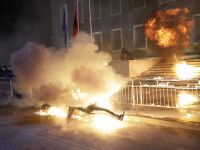SMIS: Seven Minutes Indignation Syndrome
This new syndrome can be easily diagnosed as most Lebanese suffer from it. SMIS can only be detected when something shocking, unfair or unjust makes the evening news or creates a buzz on the Internet.
Dear Charlie Rose, I was incarcerated in a men’s prison for 40 days and subjected to the most brutal kind of mental torture and constant interrogations. During those 40 days, I witnessed the cruelest torture against journalists in the prison cell next to mine, journalists like Hadi Saber, whom I can still hear being beaten across the face by the interrogator, and who ended up dead in hospital for unknown reasons.
As a journalist and human rights activist, I watch with regret when Mr Zarif blatantly lies in front of the cameras of a broadcaster, without any shame with regard to public opinion, while many Iranians are still in prison for simply holding certain beliefs. Even when they are freed, they enter a bigger prison, where they will constantly be monitored and fear arrest. These people have already lost their family, their job, and their dignity. They have had their lives ruined.
If it weren’t for fear of prosecution, my friends in Iran would write a testimony letter just like mine. They do not have access to a broadcaster to voice their protest against Javad Zarif — while you give him a platform, viewed by many, to lie. I am not hopeful that you will read my letter. If you do, I expect you to tell the world the story of journalists, human and women’s rights activists, and minorities in Iran who have experienced dark days in prison, undergone interrogation, and even received death sentences in some cases.
Source: Iran Wire
Assyrian families seek refuge in Beirut
Syria Deeply spoke with displaced Assyrian families who fled to Beirut after Jabhat al Nusra and ISIS arrived in their hometown of al-Hasakah. Many of them have relatives presently held hostage by ISIS. There are some 800 Assyrian families from surrounding communities who have been exiled to al-Hasakah, according to the Lebanese Assyrian Church’s Bishop Yatron Koliana, who works with the government to facilitate refuge for Assyrian refugees. “Kidnappings were about getting ransom from rich families or individuals at first. With Da’esh, though, there is no negotiating. We had to pay the jizya tax or die,” Zayya said, referring to a compulsory tax that religious minorities pay under the Islamic caliphate.
After a hardline Libyan sheikh from ISIS was appointed as emir of the al-Hasakah area, crosses were removed from the churches and destroyed, and wearing a crucifix was forbidden, Zayya says. Christians were not allowed to drive or ride in automobiles, and women were mandated to wear a burka. “Our children saw many beheadings,” he said. “We were obligated to watch public executions. What kind of world is that for kids to grow up in? They were always scared.”
Source: Syria Deeply







